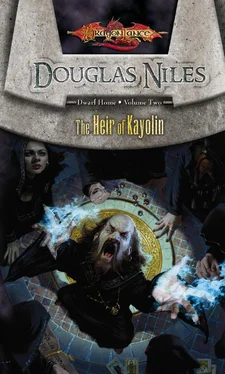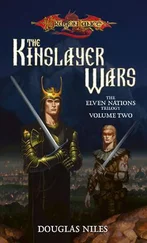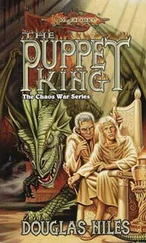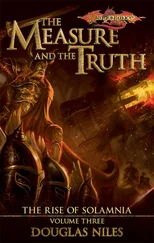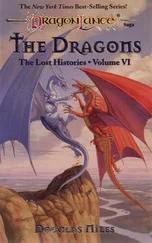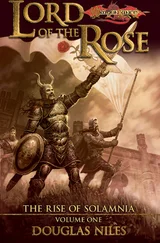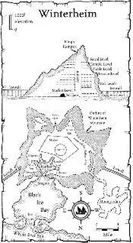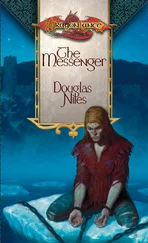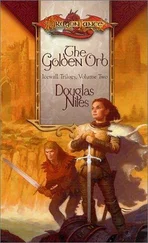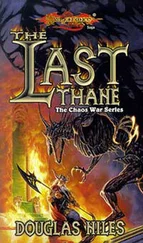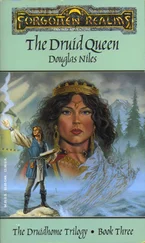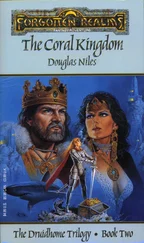Douglas Niles - The Heir of Kayolin
Здесь есть возможность читать онлайн «Douglas Niles - The Heir of Kayolin» весь текст электронной книги совершенно бесплатно (целиком полную версию без сокращений). В некоторых случаях можно слушать аудио, скачать через торрент в формате fb2 и присутствует краткое содержание. Год выпуска: 2012, ISBN: 2012, Издательство: Random House Inc Clients, Жанр: Фэнтези, на английском языке. Описание произведения, (предисловие) а так же отзывы посетителей доступны на портале библиотеки ЛибКат.
- Название:The Heir of Kayolin
- Автор:
- Издательство:Random House Inc Clients
- Жанр:
- Год:2012
- ISBN:9780786962686
- Рейтинг книги:5 / 5. Голосов: 1
-
Избранное:Добавить в избранное
- Отзывы:
-
Ваша оценка:
- 100
- 1
- 2
- 3
- 4
- 5
The Heir of Kayolin: краткое содержание, описание и аннотация
Предлагаем к чтению аннотацию, описание, краткое содержание или предисловие (зависит от того, что написал сам автор книги «The Heir of Kayolin»). Если вы не нашли необходимую информацию о книге — напишите в комментариях, мы постараемся отыскать её.
The Heir of Kayolin — читать онлайн бесплатно полную книгу (весь текст) целиком
Ниже представлен текст книги, разбитый по страницам. Система сохранения места последней прочитанной страницы, позволяет с удобством читать онлайн бесплатно книгу «The Heir of Kayolin», без необходимости каждый раз заново искать на чём Вы остановились. Поставьте закладку, и сможете в любой момент перейти на страницу, на которой закончили чтение.
Интервал:
Закладка:
Yet a strange thing had happened to him during that war. The words of Stonespringer, emerging from the dwarf’s mouth as if they were drops of gold spraying from Reorx’s own forge, had touched Ragat deeply, inspiring a new seriousness, which, matched by his well-known combat skills, had helped him become a sergeant. He easily made captain not long thereafter. Listening to the aspiring ruler’s wise words, his entreaties toward faith and discipline in the name of Reorx, Ragat had found himself moved and ashamed of his own past, his weaknesses. In the wake of hearing that first speech, Ragat had resolved to cast aside his wicked ways and meet his new ruler’s high expectations.
His skills as a fighter had propelled him upward through the ranks of the new king’s army. During a crucial battle, all of Jungor’s bodyguards had been injured or slain, and Ragat himself had stood before his commander, killing any who dared approach.
For his stand, he had been awarded the title of “General Ragat Kingsaver,” and he had fought at his lord’s side for the rest of the short, violent war. When Jungor Stonespringer won the throne of Thorbardin, he rewarded Ragat with command of all the royal troops. He had even offered him a woman as a prize, the beautiful daughter of one of the king’s enemies. Ragat hadn’t been particularly interested in the woman, and when she had taken her own life, Stonespringer had been more distressed than his loyal subordinate.
Finally, the king had ordered a special talisman forged for his loyal general, a shield made from platinum and steel, blessed by all the priests of Reorx. It was unbreakable and shone like a beacon of righteousness whenever danger threatened the throne.
The fiery blessing of Reorx was strong in the king, and it gave to Ragat a sense of purpose that had been lacking in his earlier campaigns. A member of a gruff race of tough individuals who placed little weight on sentiment, Ragat Kingsaver had embraced his monarch’s values, his creed, and his personality with all of his warlike heart. His shield was the physical proof of that loyalty, that love. He would gladly lay his life down for his king.
The general’s troops were garrisoned on the lower level of the royal palace itself. His two thousand dwarves were the elite of Jungor Stonespringer’s army, veterans of the battles that had brought the king to power; rewarded well for their service; loyal, like him, to the last drop of blood to the king and his noble, god-blessed cause. Right at that moment they were proving their mettle-rallying, arming themselves, pouring from their barracks, forming into companies and regiments under prodding by sergeants and captains.
Ragat could see from his vantage that the three main gates on the south side of the city, the portals connecting Norbardin to the environs of the Urkhan Sea, had all been breached by a swift and aggressive attack. He was at a loss to understand how all three bastions could have fallen so quickly and simultaneously. He wondered what had happened, and though he suspected sorcery he knew that there was nothing he could do about that, not anymore. Instead, he had to act fast and contain the damage.
“Sergeant Major!” he barked as the dwarves of his division formed up before the royal palace.
“Yes, General!” said Barx Standfist, the veteran centurion who had served with Ragat on every campaign over the past three decades. Standfist, already wearing his plate armor, with his mustache and beard waxed stiffly, stood at attention just a few steps away. The general couldn’t repress a smile at the display of his old sergeant’s readiness.
“I want every reserve company in Norbardin mustered at once. Have them report to the training yard on the other side of the palace. Then put out the word to the quartermasters. We will need a new draft of recruits; have them start the processing immediately.”
“Aye, sir. At once,” replied the veteran sergeant major. Instead of starting away at once, however, he cleared his throat, shuffling his feet.
“Yes?” asked the general, knowing from experience that the old veteran wouldn’t waste time with delay or idle conversation.
“Every one of the south gates fell,” Standfist said. “Do you think … well, might it have been treachery?” he growled.
Ragat could only shrug. “Either that or wizardry. No, I can’t think of any other explanation. But now is not the time to worry about spilled milk. Go!”
“Aye, sir. I’ll start the mustering right away.”
With that, the loyal subcommander departed. Ragat turned to study the battle that was spreading across the terraces of the great plaza.
Clearly, the unknown enemy was attacking with three distinct columns. One of the formations seemed to be made up of Klar berserkers. Their whooping and howling, the gleeful, almost musical, sounds of their wild fighting carried clearly to Ragat’s ears. The Klar were advancing rapidly into the plaza, but already some of the impetus of their charge was seeping away as the notoriously unreliable troops stopped to loot the shops and stalls or wandered into the side streets and alleys leading to the taverns of one of Norbardin’s seedier neighborhoods. Ragat knew the Klar would not be the worst threat, at least not right then.
The force to the right was coming up against a solid formation of the royal guard. The guard formed a line of shields linked together almost like a wall. Ragat suspected that the surviving troops of the initial garrisons had banded together under an intrepid captain and, rather than dispersing themselves against the great numbers of the enemy, had concentrated their strength in that fashion. To Ragat’s practiced eye, the shield wall looked like a good tactic, and the garrison dwarves seemed to have a reasonable chance of holding firm.
That left the middle prong of the enemy attack as the main threat. Ragat could see that it was the most numerous of the three columns and included a mix of several troop types: he noted crossbows launching lethal volleys of missiles, burly axemen charging in a wedge, and infantry advancing in a line, also with linked shields.
By the time he concluded his survey of the battlefield, the front rank of the royal force was already advancing, lightly armed skirmishers forming a line that bristled with the steel tips of short, deadly spears. Ragat raced down the stairs and out the palace gate, where he found the company commander. The general waved him forward, using both hands to signal the charge. Immediately, the spearmen charged into the square, their battle cry-“For Reorx and Stonespringer!”-roaring from five hundred throats.
Even as the first rank charged, the other regiments of the division tightened behind the spearmen. One by one, they girded themselves, standing shoulder to shoulder, and they started across the plaza. In a matter of a few minutes, Ragat could see the front rank of the attackers brace and halt, staggered by the sudden counterattack.
As the rest of the division marched forward, the momentum of the battle shifted, and the attack was broken.
Then the rest of the royal garrison spilled out of the palace. When Ragat sent those fresh troops surging into the fight, he knew that the city of Norbardin would not fall, not on that day.
FIVE
Willim looked over the battlefield with steadily mounting frustration. The Theiwar commander stood atop a captured gate tower, a vantage with a view across the entire Center Gate of the city’s main defensive line. The troops of the rebel forces held the gate, the towers to either side of that wide portal, and the minifortresses carved into the bedrock of the cavern in support of those gate towers. From each fortress, a narrow, lofty bridge arched toward Norbardin’s wealthiest districts. Below, the wide plaza, usually a scene of vigorous commerce, spread out as a ravaged battlefield, marked by upturned carts, wrecked stalls, and many dying and dead dwarves.
Читать дальшеИнтервал:
Закладка:
Похожие книги на «The Heir of Kayolin»
Представляем Вашему вниманию похожие книги на «The Heir of Kayolin» списком для выбора. Мы отобрали схожую по названию и смыслу литературу в надежде предоставить читателям больше вариантов отыскать новые, интересные, ещё непрочитанные произведения.
Обсуждение, отзывы о книге «The Heir of Kayolin» и просто собственные мнения читателей. Оставьте ваши комментарии, напишите, что Вы думаете о произведении, его смысле или главных героях. Укажите что конкретно понравилось, а что нет, и почему Вы так считаете.
